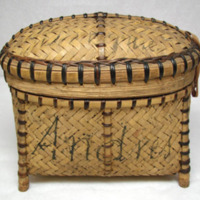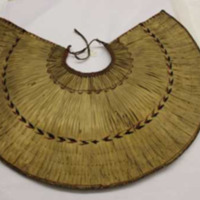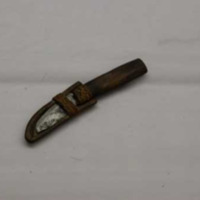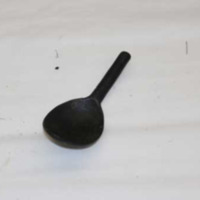Necklace (Manic)
Text
"Woven around reed of straw and wooden raffia, carried by men and women." Gathered in the mountains of Zambales and Bataan, April 1880.
Share this
Media
Images
Map Museum of World Cultures in Frankfurt (Weltkulturen Museum)
Metadata
Date
Before April 1880
Identifier
28821
Origin
Zambales, Philippines
Aëta/Aetas
(Traditionally, Aëta/Aetas are hunting and gathering indigenous people. They're actually among the most skilled when it comes to jungle survival – they are even able to make use of plants as herbal medicine and possess tools and weapons.)
Aëta/Aetas
(Traditionally, Aëta/Aetas are hunting and gathering indigenous people. They're actually among the most skilled when it comes to jungle survival – they are even able to make use of plants as herbal medicine and possess tools and weapons.)
Materials
Bast, pipe
Physical Dimensions
Diameter: D. max .: 18.5 cm
Provenance
Purchased from August Möckel
Acquisition Date
1932
Display status
Not on display
Acknowledgements
Contributed by Yanni R. Hernandez,
Photo: Weltkulturen Museum (Museum of World Cultures) Frankfurt, Germany
Photo: Weltkulturen Museum (Museum of World Cultures) Frankfurt, Germany
Official Website
Collection
Source
Translated from German by MPMC RA's and editors. Record accessed November 2021.
Cite this Page
“Necklace (Manic),” Mapping Philippine Material Culture, accessed April 20, 2024, https://philippinestudies.uk/mapping/items/show/15065.
Tags
Geolocation
Sensitive Content
Mapping Philippine Material Culture collates digital material from institutions, and some of this material is inherently colonial and contains words, terms and phrases that are inaccurate, derogatory and harmful towards Filipino and Filipino diasporic communities. Catalogue transcriptions, book titles, exhibition titles and museum titles may contain harmful terms. We recognise the potential for the material to cause physical and mental distress as well as evoke strong emotions. Owing to the scale of the collection’s data, a process to implement sensitive-content warnings in the displayed data is still incomplete. The material within the catalogue does not represent Mapping Philippine Material Culture’s views. Mapping Philippine Material Culture maintains a strong anti-colonial, anti-racist position and affirms its support for centring the humanity of historically marginalised and disenfranchised communities.
Facebook Twitter



